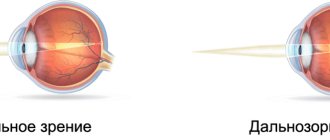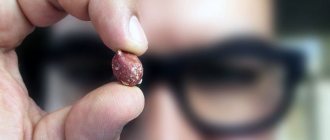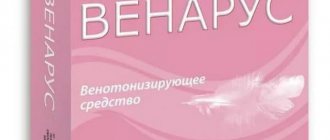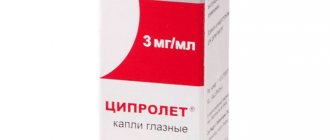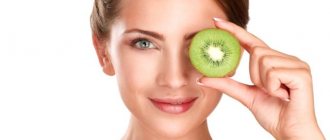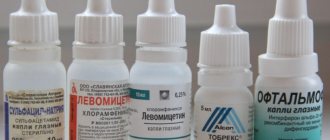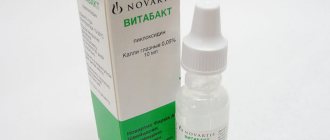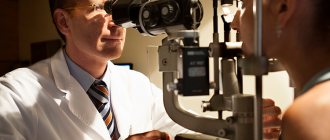The effectiveness of drops and vitamins for farsightedness
Farsightedness, or hypermetropia, often occurs in people over 40 years of age. At this time, the membranes of the eye lose their elasticity and cannot fully perform their functions. In order to stop pathological processes, doctors prescribe drops.
Even with optimal correction of farsightedness using glasses, some patients experience dry eyes and redness. To get rid of unpleasant sensations, you need drops that support the mucous membrane and prevent vision deterioration.
conclusions
Farsightedness, especially in the initial stages, can be corrected with the help of nutrition, therapy, wearing glasses and contacts, as well as various vitamin complexes. You need to monitor the condition of your eyes in order to take appropriate measures in time. Doctors recommend that patients with farsightedness:
- take prescribed vitamins;
- adjust your diet;
- lead a healthy lifestyle and avoid overexertion;
- Get regular check-ups with your doctor and have your vision checked.
List of the best drops
Drugs used for farsightedness significantly improve the quality of vision. They contain several active substances that complement each other. All of them are prescribed only by a doctor: their independent use threatens further deterioration of vision.
Taufon
These drops contain the active substance taurine. With age, the synthesis of this substance deteriorates. Action of Taufon drops:
- ensuring adequate nutrition of eye tissues;
- improvement of metabolism in the eye structures;
- maintaining normal functionality of cell membranes;
- strengthening the processes of restoration of affected tissues.
In order to normalize and improve vision, you need to undergo treatment with the drug at least 3 times a year. This requirement is especially relevant for those who work for a long time in front of a computer monitor. Taufon is also a good remedy for preventing pathologies associated with trauma or damage to the cornea.
It is usually recommended to take 1 drop four times a day. The course of therapy is from 1 to 1.5 months. The drug is prohibited for use during pregnancy and in patients under 18 years of age.
Taurine
Taurine is an effective drug based on a cysteine derivative - taurine. Indications are the same as for Taufon. Taurine prevents the formation of cataracts due to its retinoprotective effect. Reduces pressure inside the eye in open-angle glaucoma.
Instill 2-3 drops three times a day. The course of therapy with Taurine can be up to 3 months. It is prohibited to use drops to treat children. If necessary, it is repeated after a month's break. Do not use taurine drops for a long time to avoid irritation of the mucous membranes of the eyes.
Reticulin
The drug is used to improve vision in age-related farsightedness. Reticulin reduces the likelihood of disruption of the functionality of the cornea, lens and retina. Instillation of this drug into the eyes prevents the development of infections and prevents accommodation spasms.
Nutrition correction
To organize proper nutrition for farsightedness, it is important that a person’s diet contains all of the above products in sufficient quantities. If necessary, it is possible to compensate for their deficiency by taking vitamin complexes.
Rosehip decoction has proven itself well for farsightedness. You can drink it instead of tea. A special effect is achieved by adding honey to it. This simple remedy can significantly improve vision in patients with farsightedness.
For this eye disease, freshly squeezed juices are very useful, not store-bought, but home-made. They can be drunk in any quantity, but it is better if they are diluted with two parts of water before use. A cocktail made from grapefruit, lemon and orange juice is very good, always with the addition of water. It will be enough to drink only 100 g of this mixture before meals.
Onions and garlic, due to their sulfur content, help maintain clear vision.
No less useful are self-prepared juices from berries - currants, cherries, wild berries. As you know, blueberries are the most beneficial product for the eyes, simply a unique source of all the most necessary substances, which contributes not only to prevention, but also to restoration of vision and normalization of intraocular pressure. Just like a lack of vitamins, their excess has a detrimental effect on the body. Find out what the disease is called when you can’t see well up close here.
Cottage cheese improves blood circulation in the eye, normalizes metabolic processes in the lens and cornea.
Despite the ban on sweets for farsightedness, dark chocolate contains a useful component - flavonoids, which serve to strengthen the blood vessels of the eye and cornea.
There is also a list of foods that are undesirable and even dangerous for farsightedness.
The very first alcohol-containing drinks on this list. Their use increases the pressure inside the eye, and the eye muscles suffer greatly. Also, if you are farsighted, you need to stop smoking; nicotine, no less than alcohol, contributes to vision loss. Dangerous foods include sugar, processed foods and fast food, breads and cereals, coffee and tea. The greatest threat is posed by sweets, in any form, as well as canned foods and smoked foods (due to high cholesterol levels, they have the most detrimental effect on the organs of vision and increase pressure inside the eye). It is equally important to reduce your consumption of fried foods. White bread promotes increased insulin synthesis, which causes a sharp drop in the level of protein needed to maintain proper eye function. This article will tell you about anti-glare glasses for drivers.
Vitamin complexes
A modern person spends a lot of time on a computer, smartphone or tablet. All this significantly worsens vision. Vitamin complexes are used to relieve tension in the eye muscles. They soften the effects of visual overload and increase eye stability.
Vitamin therapy is indicated for those patients who wear contact lenses that correct farsightedness. The use of contact lenses is sometimes associated with irritation and dryness of the eyes. Drops containing vitamins help eliminate unwanted symptoms associated with wearing flexible optics.
Eye drops contain:
- carotene;
- folic acid;
- riboflavin;
- niacin;
- thiamine;
- cyanocobalamin;
- pyridoxine.
These drops cannot be used without a doctor’s permission, much less abused. The dosage must be selected correctly, because an excess of drugs is very harmful. When using drops with vitamins, it is recommended to take breaks, because if the eye tissues become saturated with active substances, they will cease to be active.
The following highly effective medications are recommended for the treatment of eye diseases:
- Kuspavit. These drops protect eye tissue from toxins and free radicals. They are recommended for hypermetropia and cataracts (as part of complex therapy). Kuspavit is also used to treat retinopathy and macular degeneration
- Zorro is a combination drug that includes vitamins and herbal extracts. The drug prolongs the functionality of the eyes and moisturizes the mucous membranes well. Eliminates burning, pain in the eyes, and their redness. It is used in cases where the patient feels “sandy” and suffers from increased sensitivity to bright light.
- Sante 40 are drops containing substances that are beneficial for the eyes - taurine, panthenol and tocopherol. Helps restore damaged cornea and other eye membranes. Drops are prescribed for symptoms of visual fatigue, accompanied by itching, redness, swelling, and a sharp decrease in visual acuity. With prolonged use, the pressure inside the eye is normalized.
- Oftan Katahrom are drops containing adenosine, ascorbic acid and cytochrome. They normalize local metabolism and tissue regeneration processes. Oftan Katahrom is an excellent means of preventing cataracts in patients with hypermetropia. When using drops, side effects are possible - irritation of the conjunctiva, nausea, feeling of lack of air, decreased blood pressure). The drug is contraindicated during pregnancy, breastfeeding and in case of hypersensitivity to the components.
- Vita-Iodurol is a drug prescribed for farsightedness and cataracts. Contains adenosine, nicotinic acid, vitamin PP, calcium. The drops improve metabolism in the lens and normalize the nutrition of eye tissue. The components of the medicine do not allow the deposition of protein substances in the cornea and lens.
- Quinax drops can fight cataract lesions. The drug is able to resolve small areas of lens clouding. Therapy with this drug is long-term and sometimes takes several years. Quinax can improve vision in hypermetropia and age-related presbyopia.
What elements are needed to restore vision?
In order for the organs of vision to always function well, a sufficient amount of various nutrients is necessary. It is no secret that vitamins for the most part are not synthesized in the body, but come from the environment. It is very difficult to control whether they enter the body in sufficient quantities or not. Meanwhile, vitamins for vision in myopia and farsightedness are necessary for a variety of reactions and can act as both activators and catalysts in them. The most important for vision are:
- Vitamin A (retinol) and provitamin A (carotene). The scheme is as follows: products of plant origin supply a person with carotene, which is transformed into retinol in the body. This element gives a person the ability to distinguish colors and see at dusk. A deficiency of this vitamin can cause a disease such as “night blindness”, provoke dry eye syndrome, swelling of the eyelids, and redness of the sclera. Most of it is found in fish oil and carrots. Find out how to distinguish farsightedness from nearsightedness here.
- Vitamin B1 (thiamine) regulates metabolic processes in eye tissues. Another important function is the transmission of nerve impulses from the central nervous system to the eye and back. The deficiency causes insufficient passage of nerve impulses into the eye. The nutrition of the visual organs decreases, which is why the eyes quickly get tired, and dystrophy of all eye structures begins. Most of it is in beef liver and, oddly enough, in pasta.
- B2 (riboflavin). It is needed both to nourish the eye and to remove unnecessary substances from the membrane of the cornea and lens. Since these areas do not contain a network of blood vessels, their nutrition is carried out through diffuse processes. Normal metabolic processes are the key to active regeneration processes in the eyes. In addition to the above, B2 is needed in order to see in the dark and perceive colors. Its deficiency manifests itself in the development of conjunctivitis and photophobia. The main supplier of this element is milk and dairy products.
- C (ascorbic acid) is one of the most powerful natural antioxidants. It is necessary to protect the eye from the harmful effects of free radicals. This vitamin is the most effective remedy for preventing age-related vision loss, that is, farsightedness. This is due to maintaining the cornea in the correct anatomical condition. With the help of this vitamin, the condition of the eye vessels is maintained at the required level, and blood supply is normalized. This occurs by strengthening their walls, thereby reducing the risk of eye hemorrhages. Everyone knows that there is a lot of it in citrus fruits and berries.
- P (rutin) enhances the effect of vitamin C. If there is not enough of it, there may be frequent hemorrhages in the eye tissue due to the fragility of the eye vessels.
- D (calceferol) prevents age-related changes in the organs of vision and maintains the necessary visual acuity.
- Lutein is, according to ophthalmologists, the most beneficial substance for the eyes. It is also not synthesized in the body, but comes from food (eggs, carrots, spinach, broccoli). A daily intake of at least 5 mg of lutein promotes normal eye function and prevents the development of pathologies and degenerative processes.
- Vitamin B6 is necessary to relieve tired eyes. The main symptom of a lack of this vitamin is involuntary twitching of the eyelid. It should enter the body in an amount of approximately 2 mg per day, its main source is vegetables, fish and meat.
- B12 – is responsible for the blood supply to the eyes. It is present in milk, fish and liver.
- Zinc is a very valuable trace element for the eyes; it can even prevent the development of cataracts. Comes with beef liver, fish and pumpkin. Find out how to choose the right glasses for farsightedness at this link.
dietary supplements
For hypermetropia, dietary supplements are widely used. The main task of dietary supplements is to provide the body with all the necessary vitamins and microelements for the normal functioning of the visual organ.
The most effective dietary supplements for farsightedness:
- Okovit. The drug contains vitamins A, E, C, group B. As a result of treatment, the functioning of the retina improves and the composition of the vitreous body is normalized. Okovit prevents premature darkening of the lens. The medicine should be taken 2 times a day, 1 tablet for a month.
- Oculist - a supplement containing vitamin A, active substances of blueberries, dihydroquercetin. Indicated for farsightedness, as well as for visual impairment in poor lighting conditions. Capsules are taken 3 times a day for 3 weeks.
- Myrtilene is a dietary supplement based on blueberries. Improves blood supply to the retina and supports the functioning of the eye muscles. Patients taking Mirtilene note improved vision, relief from redness and pain in the eyes.
- Riboflavin is an eye drop that normalizes the condition of the eyes and prevents the development of complications with hypermetropia and cataracts. The product is instilled into the eyes 2 times a day.
- Focus is a supplement that improves near vision. The drug contains vitamins and microelements that are beneficial for the organ of vision. You should take these tablets once a day for a month.
Consumer Reviews
Irina: I used vitamin complexes against farsightedness - Myrtilene and Focus. I noticed an improvement in my vision from the third day: it became noticeably easier to read, and during visual work the feeling of fatigue and pain disappeared. The doctor helped me choose glasses that corrected my vision while reading.
Oleg: To improve vision at close range, I used Taufon eye drops. After a week of instillation I noticed some improvement. At the same time, the pain in the eyes and the feeling of sand during prolonged visual work disappeared.
Useful video
More useful and interesting information about eye medications for farsightedness can be found on the Internet pages
Drugs used for farsightedness help improve vision, relieve discomfort while wearing glasses, and prevent itching, pain and redness in the eyes. Like any other medicine, they should not be taken independently without a doctor's prescription. However, using the medications discussed above does not solve the cause of farsightedness. Wearing properly fitted glasses will help preserve your vision.
Author's rating
Author of the article
Alexandrova O.M.
Articles written
2031
about the author
Was the article helpful?
Rate the material on a five-point scale!
( 2 ratings, average: 3.50 out of 5)
If you have any questions or want to share your opinion or experience, write a comment below.
